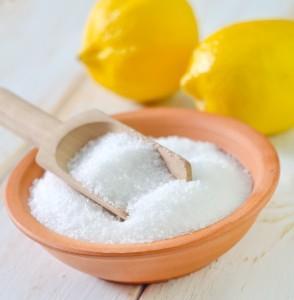 Citric Acid
Citric Acid
Naturally found in bitter/sour tasting fruits such as oranges, limes, lemons, grapefruits, etc; citric acid is the naturally occurring organic acid that gives such fruits mentioned above their typical sour taste. Although citric acid is found in various fruits and vegetables including raspberries, tomatoes, and some peppers, it is most potent in limes and lemons consisting of up to 8% of the dry fruit’s weight. This amount varies based on factors like climate and soil conditions.
Besides fruits and vegetables, citric acid can also be produced from cane sugar, molasses, and dextrose as well.
For biochemistry means, citric acid occurs in the metabolism of nearly every living creature. This is due to citric acids vital role in the Krebs cycle. Outside the metabolic role of citric acid, it is also a common go to ingredient for cosmetics, pharmaceutical, food, beverage, and cleaning industries. In fact, citric acid has been deemed safe by all major food regulatory agencies both on the national (FDA) and international end.
Sold most commonly in a powdered or crystalline form that is white, citric acid can be used as an antioxidant, preservative, pH adjuster, emulsifier, additive, cleanser, and stabilizer.
The industry yielding the most use out of citric acid is food and beverage. This is because citric acid is an additive that can be found in everything from meat to ice cream to candy and especially soda pops. Obviously, citric acid can be ingested and very few people are allergic to this ingredient. Although a typically harmless additive; this natural substance is sour and when consumed in larger quantities, may cause an upset stomach.
On the cosmetic end of things, citric acid is starting to gain popularity. More and more, people are starting to realize the benefits of using citric acid in their homemade bath and body products because of its pH adjusting abilities. Items like bath tablets and bath bombs (or bath fizzes) require citric acid as a base ingredient for their formulation. It is solely this ingredient’s interaction with baking soda that produces carbon dioxide the characteristically known and sought out fizzy action when introduced to water. Citric acid is also used in masks, peels, creams and lotions because it is an alpha hydroxy acid, giving products great exfoliate and emollient properties.
To view some great bath bomb recipes, click here.
When it comes to antioxidants, citric acid is phenomenal. Not only does this natural substance help to rejuvenate and refresh the skin, but it also helps to stall the aging process in your skin. Citric acid also works as both a tonner and a cleanser. For recipes outside of bath bombs, citric acid can be used up to .5% of the total recipes weight. To add this ingredient to bath and body recipes, simply dissolve the citric acid in a liquid, and heat the mixture to 165 degrees Fahrenheit before blending it into your other ingredients.
The cleaning industry also has many uses for citric acid. It is considered an environmentally friendly cleaning agent.
This natural substance makes a great water softener, breaking down the small amounts of metal that is commonly found in water. When it comes to treating hard water, citric acid is an optimal choice for an all natural water softener.
As for a cleaning agent, citric acid is quickly gaining popularity in kitchen and bathroom cleansers. Not only does citric acid remove hard water stains from glassware, but due to the nature of this natural ingredient, it works great as a deodorizer with its instinctive clean citrus scent.
To view a natural coffee maker cleaner recipe, please click here.
There are some cautions that should be noted with the hands on use of the concentrated (powdered form) citric acid. Always use caution when dealing with citric acid. Skin irritation may occur from interacting with large amounts of citric acid, especially if you have sensitive skin. Always wash your hands after touching citric acid. Never rub your eyes after touching citric acid. Finally, when using products with citric acid for its alpha hydroxy acid benefits; prolonged and aggressive use is not advised. Doing so will cause skin irritation. Most skin treatments that involve alpha hydroxyl acid are followed by applying a facial toner that neutralizes the skin’s ph.
To store citric acid, it should be placed in an air tight container away from moisture. The container should be kept at room temperature. This will eliminate any chance of humidity from activating its fizzing ability. If housed in this manner, citric acid can have a shelf life of up to multiple years.

